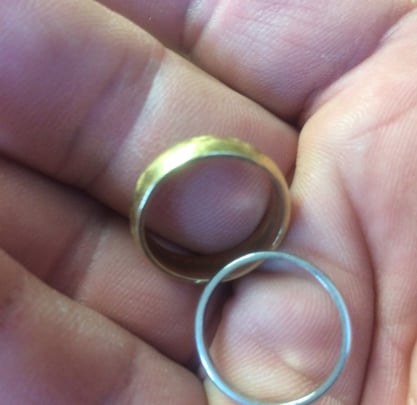Sacred Objects?


As a crisis chaplain, death calls are among the toughest calls I go on. Heightened emotion, confusion, grief, and sometimes anger can make working with people messy. Then, add culture and religion. Cultural and religious worldviews come out in a crisis, helping people understand what is happening around them. And I have found what may be sacred to one may not be sacred to another.
One early Sunday morning (around 2 a.m.), it was an older woman who had died. After the Deputy Coroner gave me clearance, I took her wedding and engagement rings to her husband. I don’t know if she had ever taken them off. (These are the rings in this picture.) These rings represented not only part of his religious worldview but an overall cultural worldview for this gentleman. His value for these rings was shaped by his love for his wife, vows, culture, faith, and experience with God. These were, in a sense, sacred objects.
Receiving them back, for this man, was a sign of the finality of his wife’s death and a reminder of the part of their wedding vows where they said, “till death do us part.” They were, to him, in a very real sense, sacred objects. I would feel the same way. So, we sat down, and he shared about his faith and family that early Sunday morning as he poured out his heart to me.
However, not everyone places the same values on the same items. I have been on many a death call where the family didn’t care about getting the rings back. The rings had no significant value to them except possible monetary value. I needed to understand this person's culture and worldview in those cases since they were different from mine. As weird as it may seem to ask about the significance of such objects, I must ask. It’s the right thing for a chaplain to do. I have found that I need to approach each scene as a humble learner, open to how people grieve and what they may find sacred in moments like these.
Each time I deal with a situation like this, it is slightly different. The older man and I shared a holy moment that early morning where he could share his life and love, and I could join with him and God in prayer. How many times as a chaplain have situations like this gone a different way? What may be sacred to one may not be sacred to another. As chaplains, we must learn about different cultures and their views on death and grief. That doesn’t mean you must agree, but we must appreciate their worldview and understanding of life, death, and faith.
